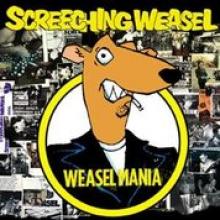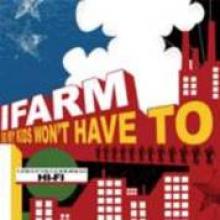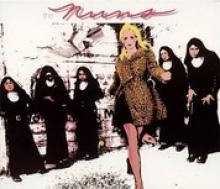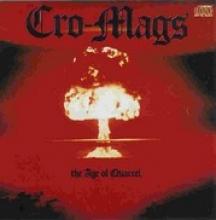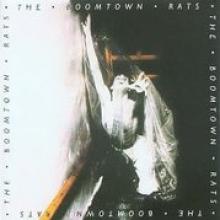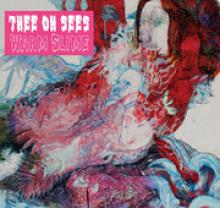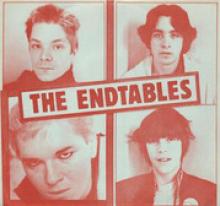The TKO's - "Young Girls" (Video)
This Cleveland band was weighlayed by what normally disrupts punk bands. Despite issuing just two seven inches during its lifetime, the band still ranks with any of CLE's legendary punk groups.
Twofer: Screeching Weasel x I Farm
Pop punk has gone through a wealth of changes since the Descendents and whoever else could be said to have informed the genre stalked the earth. Moving from something of an in-scene, underground phenomenon on the West Coast to an international movement of sorts is a pretty huge progression over the span of just thirty years.
With its commercial appeal, which is obviously relative, the genre’s gifted State’s side music fans a horde of groups to follow – including a few that seem to be aging surprisingly well. Regardless of that, a few of the progenitors are kicking around, or at least issuing retrospectives in order to spread the legacy. But in the mid nineties’ as popular music seemed poised to accommodate just about any variation on rock music, folks were blessed with the financial prowess to market and produce music in the same way major label bands were. That may or may not have been punk’s death rattle. But even if it was, there’re still folks working to keep the genre entertaining. If the music isn’t any longer appealing, at least that attitude is.
Screeching Weasel
Weaselmania
(Fat Wreck Chords, 2005)
If you listen to punk and you don’t listen to Screeching Weasel, you may want to re-evaluate your life. Thanks to Fat Wreck Chords, though, instead of wallowing in the mire of your sorry punk record collection, missing all those classics from the late eighties and early nineties, you can pick up this compilation of 34 tracks. There’s a bit from each of Screeching Weasel’s albums represented here. All the dumb-fk-punk you could possibly ever want is here including the ridiculous and harrowing “I Wanna Be a Homosexual.” Other Lookout! era hits crop up on Weaselmania as well. And if nothing else Mike Dirnt, of Green Day fame, fills in on bass for a few tracks. Shock the middle class. Take it up your punk rock ass. Don’t sleep, consumerize.
I Farm
So My Kids Won’t Have To
(Blackout Records, 2005)
The mid nineties saw a resurgence, if not in quality, then in shear numbers, of punk bands. One of these bands, which happens to have also be able to survive the decade, is I Farm. Clever name; clever title. I can’t say that this album actually needed to be re-mastered - reissued, maybe. But the time spent reworking how these tracks are voiced may have been a waste of time. What is to be found on this disc, though, is extremely fast hardcore/metal influenced punk. There are hints of Anti-Flag and NoFX, the later perhaps being a lyrical inspiration. However, what this release lacks in skill or thoughtful lyrics, the band repays the listener in intensity. I Farm won’t change your life, influence future generations of punk or make a particularly good coaster. But it does show that if you work hard enough, regardless of who or what you are, if you believe in what you scream about, your screaming will be heard eventually. Don’t give in, seriously.
The Nuns: Out of Time
Part of working up a legacy is having firsts (of one kind or another) as a part of a career. After a certain point in any genre, though, that becomes relatively difficult. And punk by the time it had solidified during the mid to late seventies doing something first was pretty difficult. Of course, turning into a hardcore focused ensemble might have worked, but that’s almost a different animal than punk.
Either way, some count the Nuns as one of the first punk bands in California, dating the group’s inception around 1975. That’s really a difficult thing to figure – dating groups is really a thankless and eventually useless endeavor. Either way, there are still some folks who figure the Nuns as issuing the first punk single in Cali as well. Again, who knows? Surely, no one in the band was keeping vigilant details. What isn’t debatable, though, is that Alejandro Escovedo was the bands guitarist – so the Nuns count as the first band he was in. There’s one. But seeing as most folks don’t really care too much about Escovedo’s mélange of music that might not be too big a deal either.
Oddly, enough, though, the Nuns, alongside another femme fronted punk group, the Avengers, opened for the Sex Pistols at its last show in San Francisco. So, while that might not be a first, it’s a pretty heady moment to be associated with. It’s just that most folks aren’t familiar with the Nuns at all. In mentioning the Avengers, though, its presence on the scene might have something to do with that.
Whatever the case, the Nuns issued a long player in 1980. And even with that cover summoning images of Blondie, the effort didn’t do too much in the way of raising the group’s visibility. And considering that the ensemble had been around for about five years, predating ‘punk,’ it seems as if they should have all just called it a day prior to issuing the disc.
What’s most problematic when taking a listen to the self titled disc is the Nuns’ inability to stick to some semblance of a singular sound. With three different vocalists working up lyrics and songs, there’s not a cohesive bent to the album. The difference between The Nuns’ opening track, “Savage” and “Confused” is pretty expansive. Just switching from a female singer to a male vocalist makes the group come off as a more aggressive act. It might in part have to do with the song’s tempo, but the two guys singing over the course of this first album are able to toughen up the Nuns – and it’s a much needed aspect.
A portion of this scattered approach to the album might have something to do with new wave being a real market force by 1980. And considering the band wasn’t too far from that sound in the first place, the few fey tracks might be the ensemble attempting to make headway in the popularity department. Whatever the reason, though, the disc is tough to get through. And since there aren’t any back to back stunners, the Nuns have seemingly been relegated to the dustbin for a reason.
Cro-Mags x That Tough Guy Stance
Harley Flanagan thinks you’re a moron. That’s all well and good, but he thinks you’re an idiot for caring about the music that he worked up between his teenage years and about his mid twenties or so. Again, that’s fine. And while the perspective on his fans might be skewed, it’s for good reason seeing as not too long after the dissolution of his earliest ensemble, the Stimulators.
Flanagan is obviously an important part of punk history at this late date. And even if he figures the mid ‘80s work he did to be a joke there are those that disagree. Some, though, hold roughly the same beliefs as him.
And speaking of beliefs, by the time that Cro-Mags’ 1986 Age of Quarrel rolled out, the hardcore scene had, for the most part, devolved into a handful of nonsensical, overly politicized enclaves that for some reason weren’t able to get along despite desiring the same things. Tough guy stances are today part and parcel with the genre – just like too many tattoos, skanky girlfriends and unerring love of the Japanese scene. There’s a reason for all of it. And along with Henry Rollins, folks should probably blame Flanagan for a bit of that.
Coming under the sway of the Hare Krishna belief system, Flanagan and scores from the New Yawk scene begin inserting religious undertones (sometimes actually, it was just overt) into its lyrics. Admittedly, that’s better than hearing another song about school sucking, but not by much.
Whatever the case, Cro-Mags served up some break neck pacing on its debut long player that along side all of that earth saving, living right stuff remains a pillar of the genre. By 1986, though, in part because of that tough guy thing, hardcore had absorbed more than just a few metallic musical ideas. And really during songs like “Street Justice” it gets difficult to differentiate between what’s going on here and what Metallica was doing a few years earlier. Beyond the fact that the song’s lyrics detail squaring things, the guitar’s tone has very little to do with punk. Yeah, it’s a feat for a band to hold down the tempo for a prolonged period of time, but really, at this point, you might as well reach for some Biohazard or whatever other crossover act was kicking around at the time.
Despite the bellyaching, Age of Quarrel isn’t totally void of enticing music even if “Seekers Of The Truth” might be one of the more offensive tracks recorded during the ‘80s – and that includes the entirety of Culture Club’s catalog. “By Myslef,” even if it doesn’t sound as if the formula’s changed arrives sounding a bit punkier than other tracks offered up here – please disregard that obnoxious guitar solo. It’s pretty slim pickings, though. And with this disc being the first of the group’s releases, it’s pretty much all down hill from here.
The disc’s purpose could be debated – art as politics or something. But with hardcore’s extensive back catalog, ignoring the tough guy New Yawkers shouldn’t really be too much of a trial.
Boomtown Rats' - Self Titled Albim (1977)
There existed a weird difference between punk groups from the UK and acts stationed in the States. Of course, the musical landscape must have been drastically different in the western portion of the Atlantic to have allowed for the Sex Pistols to hit the top of the charts. And even if the Ramones should have had that success, there was something that limited the band – which is pretty curious considering the group was endlessly more marketable than it’s dirty Brit counter parts. What eventually happened in the States, though, was that a few folks figured out that if one were to repackage, rename and slightly alter punk, it’d be a pretty successful endeavor – thus new wave.
While that term was levied by some players who actually mattered, for the most part it was a media construct serving to offer up an alternative to the alternative, one that would sit well with mom and dad who weren’t threatened by skinny ties and matching suits. That was all familiar.
What cropped up in England – and its associated territories at least – was that some acts came upon this confluence of nasty punk styled aggression with an eye towards more traditional pop stylings. It’s interesting to hear one off singles that still maintain ties to act's entire catalogs while adding '77 style to it all. The Undertones and its hit “Teenage Kicks” are a decent example of an otherwise poppy sounding band racking up a punker chart toper. Either way, there were a number of acts working in this mode. The Boomtown Rats were one of them.
Fronted by writer turned miscreant Bob Geldof, the group sported a split personality of sorts. The acerbic singer was capacious of unloosing nasty yowls, but the next moment he might be attempting to croon a bit accompanied by an engorged ensemble and its sax player. The Allmusic review of the group’s first disc references good ole Bruce Springsteen when figuring "Joey's on the Street Again." Even with that slight (that should be perceived as a negative critique) there were a few golden moments over the course of the 1977 release.
Best know, the first two tracks off of Boomtown Rats are also the most punk inflected. Rowdy “Lookin' After No.1” opens the entire disc with chorded simplicity. It’s at once reminiscent of the Stiff Little Fingers, the group’s countrymen, but Geldof is able to shove in a good bit of melodicism alongside the quick step pacing. Ensuring supreme popness, there’s even some “ohhhs” and “ahhhs” during the chorus. What makes this punkier than it would be otherwise is the concerted effort of the song’s lyrics to be wrapped up in self. And if nothing else, punk is full of itself. Geldof’s writing features that prominently.
The following track, “Mary Of The 4th Form,” could have been an outtake from the Damned’s first sessions. It’s not a bummer, but after the album opener, there’s not too much in the next eight tracks that’s gonna be able to replicate the tension roused during the first three minutes of the disc. Decent if not great – but that opener’s worth exploration.
Thee Oh Sees - Warm Slime (In the Red, 2010)
John Dwyer and Thee Oh Sees aren’t drastically different than any other ensemble mining the vaguely popular genre. The band’s issued a torrent of singles, albums and splits over the last few years with shocking consistency. Its Warm Slime, issued through In the Red, maintains Thee Oh Sees streak. There’s not a downer in the clutch of 7 songs, but there’s also nothing to be shocked by – even the track that’s intended to be surprising.
In 1967 Sky Saxon and the Seeds issued a disc called Future. The closing track was a seven minute harp-centered effort called “Fallin’.” Purposefully weird, the track was basically a re-working of “Pushin’ Too Hard” – it was still good. Saxon and company figured out a manner in which to capture the garage beat and include an unexpected influence. And while it might be a bit far fetched to figure the group was listening to Alice Coltrane or Dorothy Ashby, the orchestrated psych stuff coming out of the UK could have played a part in all of this.
Regardless of where that notion came from for Saxon and the Seeds, there have been a bevy of garage tracks that push towards the ten minute mark. It’s still a relatively rare thing, especially in the current crop of Bay Area groups seemingly concerned with concise grooves able to fit onto a seven inch. But how else would one go about amassing such a collectable back catalog? It’d be impossible – just odd to think that collectability, at this point, factors into small press labels conception of business.
So, the title track opening Warm Slime might be out of step with most of what’s going on. Because of the song’s construction as a unique approach to the genre, Thee Oh Sees continue to function within its self constructed confines – that means we all expect the group to be weird, so being weird is what the band does. Remember Help including a track called "Meat Step Lively" which closes in a kraut styled flute jam? Yeah, that was weird too, but intensely satisfying.
Catching the band at Schuba’s last fall, the ensemble even saw fit to end its set with that ten plus minute "Warm Slime" - assisted by the Fresh and Onlys' drummer on supplemental percussion. Watching the quartet, augmented by a fifth player should have resulted in a stellar performance, but the song just rolled along at a boring pitch. It’s hard to figure if the band amidst the throwns of an off night or not, but it doesn’t matter too much. Rather boring in a live setting, the song somehow works on record. Even if it didn’t, the following six tracks would have done the job just the same.
The Endtables - Self Titled (Drag City, 2010)
As unlikely as all the skewed punks stuff springing from CLE’s scene dating from the ‘70s, Louisville, Kentucky seems like a town that could have gotten through that decade without too many punk acts finding an avenue to record. There’s a sparse, but unquestionably strong lineage from that seat in the blue grass state. Circle X may not be the best known no wave related act, but the band was able to hit up Europe for a jaunty time on the strength of its New York appearances. A group that didn’t find itself that lucky was the Endtables, which was hitting the scene at about the same time as that aforementioned, globe trotting ensemble.
The four piece didn’t make it onto a stage until 1978, but in Louisville that counts as the first wave of punk. Yeah, it’s still Kentucky after all and we couldn’t have expected the city to spur on the movement. Still, it’s surprising to hear of work coming so early on in the genre’s development – and good work to boot. Regardless, the band worked out a sound that would today make the ensemble fit for inclusion on some KBD-styled compilation (and I’m sure the Endtables are on one of ‘em). Saved from being relegated to just a two track feature somewhere and rounding up the Endtables’ six studio tracks along with a few brief live performances, Drag City’s endeavored to issue the band’s entire catalog. It’s still only a handful of work.
Apparently, the first run of vinyl (just the studio tracks) and the ablum’s cd version (which includes those live efforts) are already sold out. Interestingly enough, though, the label is selling an mp3 version as well as FLAC files – both of which cost more than a physical copy of the record. Weird, but it points towards the imprint’s ability to understand the market place. And while that doesn’t sound too interesting to fans in passing, the fact that the Chicago label get’s it is going to allow fans to hear some more low key stuff in the future – hopefully.
The format doesn’t really matter, though, as the Endtables conjure some Stooges styled punk stuffs over the course of those studio recordings. Both “White Glove Test” and “Trick or Treat” have been properly issued as a single in the past. But apart from those two tracks, everything here’s brand spanking new and shockingly good.
Lyrically, the group’s singer, Steve Rigot attempts to throttle the establishment in roughly the same fashion that every other punk act from the time utilized. It get’s trying at points. Occasionally, his voice approaches David Thomas levels of atonality, though. Of course, since his caterwauling is frequently drowned out by Alex Durig’s guitar, it kinda doesn’t matter. Just as a final warning, the live tracks included on the cd version are pretty muddy, even by punk standards. Those first six tracks, though, are well worth the price of admission. The entire thing might be chalked to historicity, but even if its perceived that way, the disc still sounds good.
